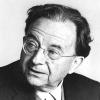Erich Fromm distinguishes between two modes of existence. One can live one’s life in the “mode of having” or in the “mode of being”. The mode of having sees everything as a possession, while in the mode of being we perceive ourselves as the carriers of properties and abilities, rather than the consumers of things.
This article is part of The Ultimate Guide to the Philosophy of Erich Fromm.
If you like reading about philosophy, here’s a free, weekly newsletter with articles just like this one: Send it to me!
Welcome back to another post in our year-long exploration of how we can live the classic philosophies of happiness in our own lives! Last time, we talked about how we can become a bit less dependent on technology in our lives and how we can try to find meaning in everyday practices like cooking a meal or washing the dishes. It is an idea that we will meet again when we talk about the lives of hermits later this summer.
The modes of having and being
Erich Fromm thinks that we can capture a fundamental difference between two entirely different ways of living one’s life in the distinction between “having” and “being.”
In a naive, grammatical view, one might think that “having” would apply to possessions (“I have a car”), while “being” would be used to describe properties of a person (“I am a singer”). But things are not so clear-cut. How about “I have a cold”? We can express the same as “I am sick,” or “I feel ill.” Do these three really express precisely the same idea — or is there a subtle but important difference between these three that we usually tend to miss?

And then: in what sense do I “have” a family? Do I “have” an education? I did “receive” one, so perhaps I should “have” it now, but does it really make sense to possess education? Isn’t it more like a skill? We also speak of “having” skills. But if you think about it, isn’t it more sensible to say that we “are” skilful in a particular way? A skill seems to be more like a property (“she can play the piano”) rather than a possession (“she has a piano-playing ability”). The opposite can also happen. “I am a house-owner,” although commonly said, seems mistaken. Being a house-owner is not a property that affects my person or that emanates from it. It is an external thing, a pure possession, so “I have a house,” seems more appropriate.

Recommended for you:
Erich Fromm (1900-1980)
Erich Fromm (1900-1980) was a German social psychologist and philosopher who had enormous popular success from the 1950s all the way to the end of his life in 1980. We discuss his work and his relation to Marxism and Freud.
In a more general sense, it seems that “having” things emphasises a duality between the owner and the thing — a …
Read the full article which is published on Daily Philosophy (external link)




